重要!语法填空中常用介词的用法
- 格式:doc
- 大小:128.50 KB
- 文档页数:72
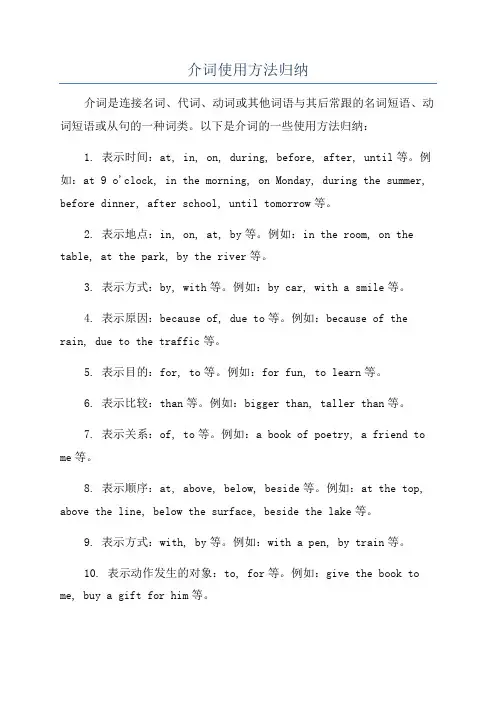
介词使用方法归纳介词是连接名词、代词、动词或其他词语与其后常跟的名词短语、动词短语或从句的一种词类。
以下是介词的一些使用方法归纳:1. 表示时间:at, in, on, during, before, after, until等。
例如:at 9 o'clock, in the morning, on Monday, during the summer, before dinner, after school, until tomorrow等。
2. 表示地点:in, on, at, by等。
例如:in the room, on the table, at the park, by the river等。
3. 表示方式:by, with等。
例如:by car, with a smile等。
4. 表示原因:because of, due to等。
例如:because of the rain, due to the traffic等。
5. 表示目的:for, to等。
例如:for fun, to learn等。
6. 表示比较:than等。
例如:bigger than, taller than等。
7. 表示关系:of, to等。
例如:a book of poetry, a friend to me等。
8. 表示顺序:at, above, below, beside等。
例如:at the top, above the line, below the surface, beside the lake等。
9. 表示方式:with, by等。
例如:with a pen, by train等。
10. 表示动作发生的对象:to, for等。
例如:give the book to me, buy a gift for him等。
需要注意的是,介词的使用往往需要根据具体的语境而定,所以在学习和使用中需要不断积累和理解具体的用法。
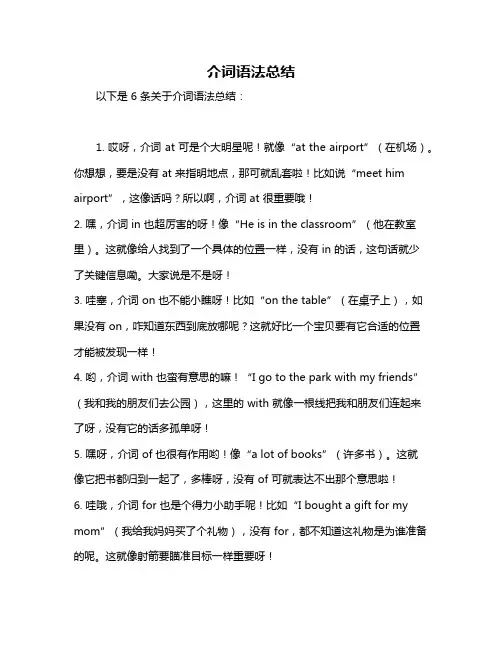
介词语法总结
以下是 6 条关于介词语法总结:
1. 哎呀,介词 at 可是个大明星呢!就像“at the airport”(在机场)。
你想想,要是没有 at 来指明地点,那可就乱套啦!比如说“meet him airport”,这像话吗?所以啊,介词 at 很重要哦!
2. 嘿,介词 in 也超厉害的呀!像“He is in the classroom”(他在教室里)。
这就像给人找到了一个具体的位置一样,没有 in 的话,这句话就少
了关键信息嘞。
大家说是不是呀!
3. 哇塞,介词 on 也不能小瞧呀!比如“on the table”(在桌子上),如
果没有 on,咋知道东西到底放哪呢?这就好比一个宝贝要有它合适的位置
才能被发现一样!
4. 哟,介词 with 也蛮有意思的嘛!“I go to the park with my friends”(我和我的朋友们去公园),这里的 with 就像一根线把我和朋友们连起来
了呀,没有它的话多孤单呀!
5. 嘿呀,介词 of 也很有作用哟!像“a lot of books”(许多书)。
这就
像它把书都归到一起了,多棒呀,没有 of 可就表达不出那个意思啦!
6. 哇哦,介词 for 也是个得力小助手呢!比如“I bought a gift for my mom”(我给我妈妈买了个礼物),没有 for,都不知道这礼物是为谁准备的呢。
这就像射箭要瞄准目标一样重要呀!
总之,介词在英语中可太重要啦,没了它们可不行哟!。
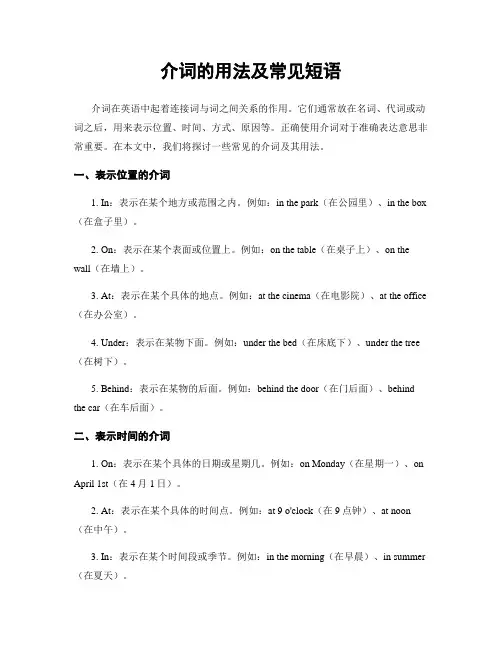
介词的用法及常见短语介词在英语中起着连接词与词之间关系的作用。
它们通常放在名词、代词或动词之后,用来表示位置、时间、方式、原因等。
正确使用介词对于准确表达意思非常重要。
在本文中,我们将探讨一些常见的介词及其用法。
一、表示位置的介词1. In:表示在某个地方或范围之内。
例如:in the park(在公园里)、in the box (在盒子里)。
2. On:表示在某个表面或位置上。
例如:on the table(在桌子上)、on the wall(在墙上)。
3. At:表示在某个具体的地点。
例如:at the cinema(在电影院)、at the office (在办公室)。
4. Under:表示在某物下面。
例如:under the bed(在床底下)、under the tree (在树下)。
5. Behind:表示在某物的后面。
例如:behind the door(在门后面)、behind the car(在车后面)。
二、表示时间的介词1. On:表示在某个具体的日期或星期几。
例如:on Monday(在星期一)、on April 1st(在4月1日)。
2. At:表示在某个具体的时间点。
例如:at 9 o'clock(在9点钟)、at noon (在中午)。
3. In:表示在某个时间段或季节。
例如:in the morning(在早晨)、in summer (在夏天)。
4. For:表示持续的时间。
例如:for two hours(持续两个小时)、for a week(持续一周)。
5. Since:表示从某个时间点开始。
例如:since yesterday(从昨天开始)、since 2010(从2010年起)。
三、表示方式的介词1. With:表示使用某种工具或伴随某人。
例如:write with a pen(用钢笔写)、go with me(和我一起去)。
2. By:表示通过某种方式或交通工具。
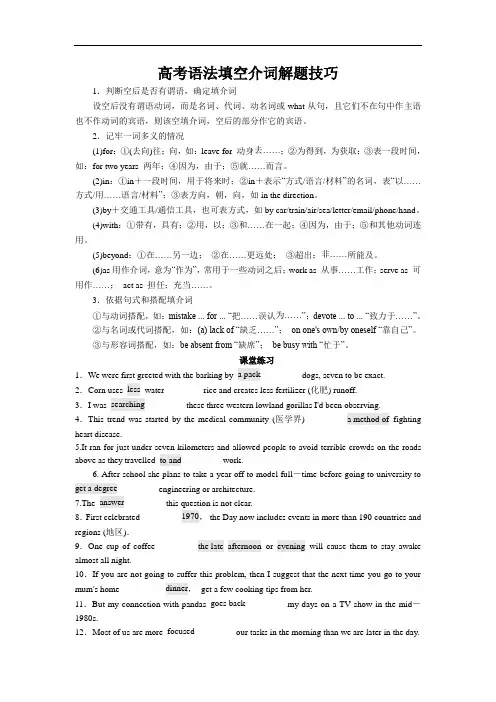
高考语法填空介词解题技巧1.判断空后是否有谓语,确定填介词设空后没有谓语动词,而是名词、代词、动名词或what从句,且它们不在句中作主语也不作动词的宾语,则该空填介词,空后的部分作它的宾语。
2.记牢一词多义的情况(1)for:①(去向)往;向,如:leave for 动身去……;②为得到,为获取;③表一段时间,如:for two years 两年;④因为,由于;⑤就……而言。
(2)in:①in+一段时间,用于将来时;②in+表示“方式/语言/材料”的名词,表“以……方式/用……语言/材料”;③表方向,朝,向,如in the direction。
(3)by+交通工具/通信工具,也可表方式,如by car/train/air/sea/letter/email/phone/hand。
(4)with:①带有,具有;②用,以;③和……在一起;④因为,由于;⑤和其他动词连用。
(5)beyond:①在……另一边;②在……更远处;③超出;非……所能及。
(6)as用作介词,意为“作为”,常用于一些动词之后;work as 从事……工作;serve as 可用作……;act as 担任;充当……。
3.依据句式和搭配填介词①与动词搭配,如:mistake ... for ... “把……误认为……”;devote ... to ... “致力于……”。
②与名词或代词搭配,如:(a) lack of “缺乏……”;on one's own/by oneself “靠自己”。
③与形容词搭配,如:be absent from “缺席”;be busy with “忙于”。
课堂练习1.We were first greeted with the barking by a pack________ dogs, seven to be exact. 2.Corn uses less water ________ rice and creates less fertilizer (化肥) runoff.3.I was searching________ these three western lowland gorillas I'd been observing.4.This trend was started by the medical community (医学界) ________ a method of fighting heart disease.5.It ran for just under seven kilometers and allowed people to avoid terrible crowds on the roads above as they travelled to and________ work.6.After school she plans to take a year off to model full-time before going to university to get a degree________ engineering or architecture.7.The answer________ this question is not clear.8.First celebrated ________ 1970,the Day now includes events in more than 190 countries and regions (地区).9.One cup of coffee ________ the late afternoon or evening will cause them to stay awake almost all night.10.If you are not going to suffer this problem, then I suggest that the next time you go to your mum's home ________ dinner,get a few cooking tips from her.11.But my connection with pandas goes back________ my days on a TV show in the mid-1980s.12.Most of us are more focused________ our tasks in the morning than we are later in the day.13.Chopsticks are not used everywhere in Asia. In India, for example, most people traditionally eat ________ their hands.14.The mother continued to care for the young panda ________ more than two years.课后练习(一)The polar bear is found in the Arctic Circle and some big land masses as far south as Newfoundland.While they are rare north of 88°,there is evidence 1they range all the way across the Arctic,and as far south as James Bay in Canada.It is difficult to figure out a global population of polar bears as much of the range has been 2(poor) studied;however,biologists calculate that there are about 20,000-25,000 polar bears worldwide.Modern methods 3tracking polar bear populations have been employed only since the mid-1980s,and are expensive 4(perform) consistently over a large area.In recent years some Inuit people in Nunavut 5(report) increases in bear sightings around human settlements,leading to a 6(believe) that populations are increasing.Scientists have responded by 7(note) that hungry bears may be congregating(聚集) around human settlements,leading to the illusion(错觉) that populations are 8(high) than they actually are.Of 9nineteen recognized polar bear subpopulations,three are declining,six 10(be) stable,one is increasing,and nine lack enough data.【语篇导读】本文是一篇说明文。
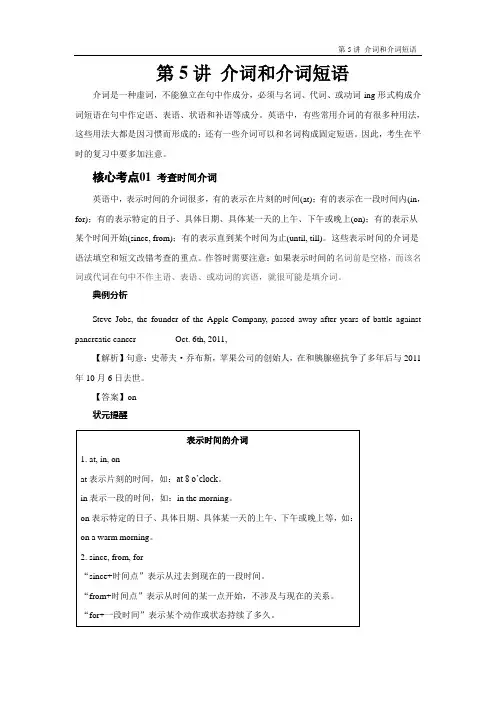
第5讲介词和介词短语第5讲介词和介词短语介词是一种虚词,不能独立在句中作成分,必须与名词、代词、或动词-ing形式构成介词短语在句中作定语、表语、状语和补语等成分。
英语中,有些常用介词的有很多种用法,这些用法大都是因习惯而形成的;还有一些介词可以和名词构成固定短语。
因此,考生在平时的复习中要多加注意。
核心考点01 考查时间介词英语中,表示时间的介词很多,有的表示在片刻的时间(at);有的表示在一段时间内(in,for);有的表示特定的日子、具体日期、具体某一天的上午、下午或晚上(on);有的表示从某个时间开始(since, from);有的表示直到某个时间为止(until, till)。
这些表示时间的介词是语法填空和短文改错考查的重点。
作答时需要注意:如果表示时间的名词前是空格,而该名词或代词在句中不作主语、表语、或动词的宾语,就很可能是填介词。
典例分析Steve Jobs, the founder of the Apple Company, passed away after years of battle against pancreatic cancer ________ Oct. 6th, 2011,【解析】句意:史蒂夫·乔布斯,苹果公司的创始人,在和胰腺癌抗争了多年后与2011年10月6日去世。
【答案】on状元提醒3. in, afterin表示“在(一段时间)之后”,常用在将来时中,表示“在……之内”可以用在过去时中;after表示在一段时间之后,常用在过去时中,表示在某个具体的时间点后,可用在将来时中。
4. by, beforeby表示“不迟于某时”,包括某时在内。
by后接过去的时间,句子要用过去完成时;before后接时间点,表示“在……之前”,不包括该时间在内。
核心考点02考查方位介词英语中表示方位的介词也很多,比如:in表示“在……范围内”,on指“与……毗邻”,to指“在某环境范围之外”,off表示“离……一些距离”或“离……不远的海上”。
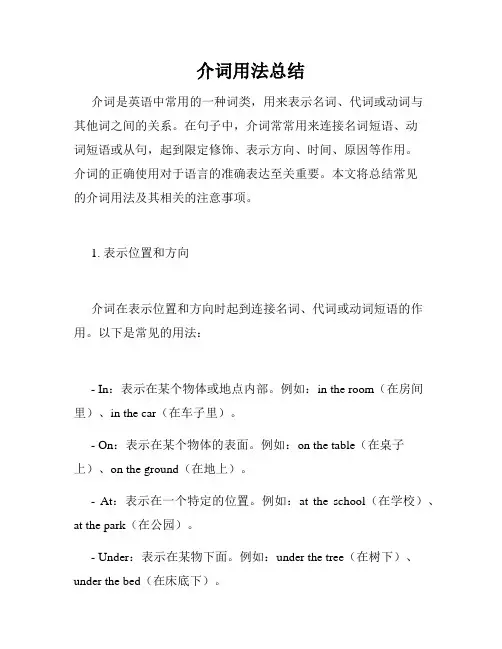
介词用法总结介词是英语中常用的一种词类,用来表示名词、代词或动词与其他词之间的关系。
在句子中,介词常常用来连接名词短语、动词短语或从句,起到限定修饰、表示方向、时间、原因等作用。
介词的正确使用对于语言的准确表达至关重要。
本文将总结常见的介词用法及其相关的注意事项。
1. 表示位置和方向介词在表示位置和方向时起到连接名词、代词或动词短语的作用。
以下是常见的用法:- In:表示在某个物体或地点内部。
例如:in the room(在房间里)、in the car(在车子里)。
- On:表示在某个物体的表面。
例如:on the table(在桌子上)、on the ground(在地上)。
- At:表示在一个特定的位置。
例如:at the school(在学校)、at the park(在公园)。
- Under:表示在某物下面。
例如:under the tree(在树下)、under the bed(在床底下)。
- Below:表示在某物的下方。
例如:below the window(在窗户下方)。
2. 表示时间介词也常用于表示时间上的关系。
以下是常见的用法:- In:表示在某个时间段内。
例如:in the morning(在早上)、in June(在六月)。
- On:表示在某个具体的时间点。
例如:on Monday(在星期一)、on Christmas Day(在圣诞节)。
- At:表示在具体的时间。
例如:at 8 o'clock(在8点)、at noon(在中午)。
- During:表示在某个时间段内。
例如:during the summer(在夏天期间)。
- After:表示在某个时间之后。
例如:after lunch(午饭后)、after work(下班后)。
3. 表示原因介词也可以用于表示原因或目的。
以下是常见的用法:- For:表示出于某种目的。
例如:for fun(为了娱乐)、for studying(为了学习)。
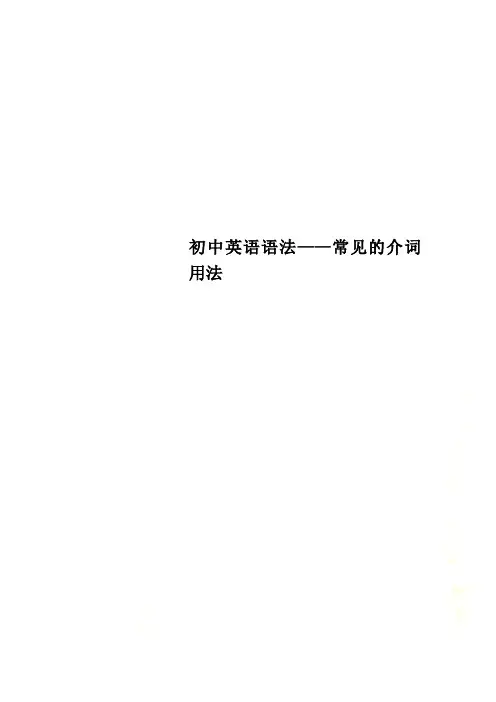
初中英语语法——常见的介词用法初中英语语法——常见的介词用法(1)表示时间的介词表示时间的常用介词有in,on,at,for,since,after,by,before,until,during等。
1.at, in, on①at用于具体的时刻前,也可以用于固定的搭配中。
I was mending my computer at noon yesterday.②in用于世纪、年、月、季节、一段时间或泛指的一天的上午、下午、晚上等之前。
Bright yellow flowers appear in late summer.③on用在具体某一天或某一天的早、中、晚或节日之前。
They’ll be here on Tuesday.2.since, for①since意为“自从......以来”,指从某时一直延续至今,后接时间点,用于完成时。
We’ve been waiting here since two o’clock.②for指动作延续贯穿整个过程,后街时间段。
He’s been off work for a while.3.after, in①after表示以过去为起点的一段时间之后,用于过去时。
She went to England after two weeks.②in表示以现在为起点的将来一段时间之后,用在一般将来时的句子中。
(2)(3)表示地点、方位的介词1.at, inat和in都可以用于表示“在某地”。
at表示在较小的地点;in表示在较大的地点。
He lives in Shanghai.2.in, on, toin, on, to都可以用于表示方位。
in表示在某一地区之内的某个方位,属于该范围;to表示某一地区之外的某个个方位,不属于该范围;on表示与某地相邻接壤。
Mexico is to the south of the US.3.on, over, under, below这一组介词都用于表示“在某物上、下位置”,但用法不同。
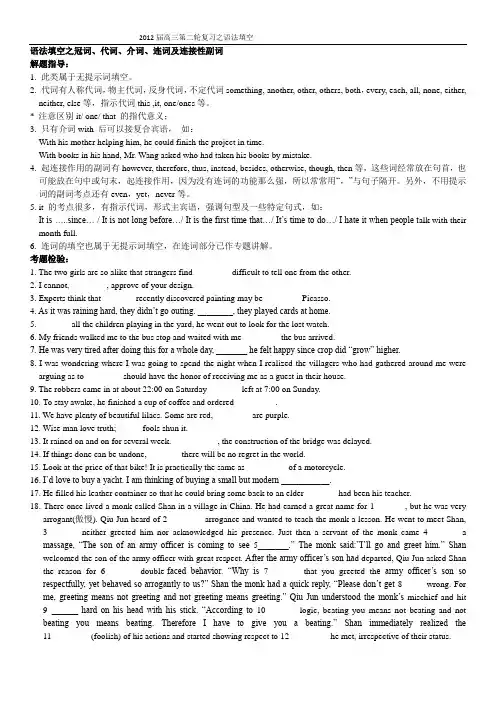
2012届高三第二轮复习之语法填空语法填空之冠词、代词、介词、连词及连接性副词解题指导:1. 此类属于无提示词填空。
2. 代词有人称代词,物主代词,反身代词,不定代词something, another, other, others, both,every, each, all, none, either, neither, else等,指示代词this ,it, one/ones等。
* 注意区别it/ one/ that 的指代意义;3. 只有介词with 后可以接复合宾语,如:With his mother helping him, he could finish the project in time.With books in his hand, Mr. Wang asked who had taken his books by mistake.4. 起连接作用的副词有however, therefore, thus, instead, besides, otherwise, though, then等,这些词经常放在句首,也可能放在句中或句末,起连接作用,因为没有连词的功能那么强,所以常常用“,”与句子隔开。
另外,不用提示词的副词考点还有even,yet,never等。
5. it 的考点很多,有指示代词,形式主宾语,强调句型及一些特定句式,如:It is …..since… / It is not long before…/ It is the first time that…/ It’s time to do…/ I hate it when people talk with their month full.6. 连词的填空也属于无提示词填空,在连词部分已作专题讲解。
考题检验:1. The two girls are so alike that strangers find ________ difficult to tell one from the other.2. I cannot, ________, approve of your design.3. Experts think that _______ recently discovered painting may be ________ Picasso.4. As it was raining hard, they didn’t go outing. ________, they played cards at home.5. _______ all the children playing in the yard, he went out to look for the lost watch.6. My friends walked me to the bus stop and waited with me ________ the bus arrived.7. He was very tired after doing this for a whole day, _______ he felt happy since crop did “grow” higher.8. I was wondering where I was going to spend the night when I realized the villagers who had gathered around me were arguing as to ________ should have the honor of receiving me as a guest in their house.9. The robbers came in at about 22:00 on Saturday _______ left at 7:00 on Sunday.10. To stay awake, he finished a cup of coffee and ordered _________.11. We have plenty of beautiful lilacs. Some are red, ________ are purple.12. Wise man love truth; _____ fools shun it.13. It rained on and on for several week. __________, the construction of the bridge was delayed.14. If things done can be undone, _______ there will be no regret in the world.15. Look at the price of that bike! It is practically the same as _________ of a motorcycle.16. I’d love to buy a yacht. I am thinking of buying a small but modern ___________.17. He filled his leather container so that he could bring some back to an elder _______ had been his teacher.18. There once lived a monk called Shan in a village in China. He had earned a great name for 1_______, but he was veryarrogant(傲慢). Qiu Jun heard of 2________ arrogance and wanted to teach the monk a lesson. He went to meet Shan, 3_______ neither greeted him nor acknowledged his presence. Just then a servant of the monk came 4_______ a massage, “The son of an army officer is coming to see 5_______.” The monk said:”I’ll go and greet him.” Shan welcomed the son of the army officer with great respect. After the army officer’s son ha d departed, Qiu Jun asked Shan the reason for 6_______ double-faced behavior. “Why is 7_______ that you greeted th e army officer’s son so respectfully, yet behaved so arrogantly to us?” Shan the monk had a quick reply, “Please don’t get 8_____ wrong. For me, greeting means not greeting and not greeting means greeting.” Qiu Jun understood the monk’s mischief and hit 9_______ hard on his head with his stick. “According to 10_______ logic, beating you means not beating and not beating you means beating. Therefore I have to give you a beating.” Shan immediately realized the 11_________(foolish) of his actions and started showing respect to 12_________ he met, irrespective of their status.。

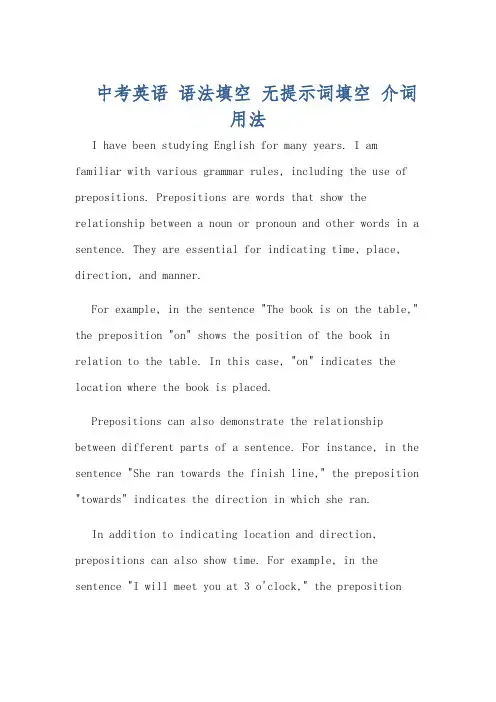
中考英语语法填空无提示词填空介词用法I have been studying English for many years. I am familiar with various grammar rules, including the use of prepositions. Prepositions are words that show the relationship between a noun or pronoun and other words in a sentence. They are essential for indicating time, place, direction, and manner.For example, in the sentence "The book is on the table," the preposition "on" shows the position of the book in relation to the table. In this case, "on" indicates the location where the book is placed.Prepositions can also demonstrate the relationship between different parts of a sentence. For instance, in the sentence "She ran towards the finish line," the preposition "towards" indicates the direction in which she ran.In addition to indicating location and direction, prepositions can also show time. For example, in the sentence "I will meet you at 3 o'clock," the preposition"at" indicates the specific time when the meeting will take place.Furthermore, prepositions are used to convey manner. In the sentence "He speaks with confidence," the preposition "with" shows the manner in which he speaks.In summary, prepositions play a crucial role in English grammar by indicating the relationships between various elements in a sentence. They are essential for conveying information about time, place, direction, and manner.我已经学习英语很多年了。
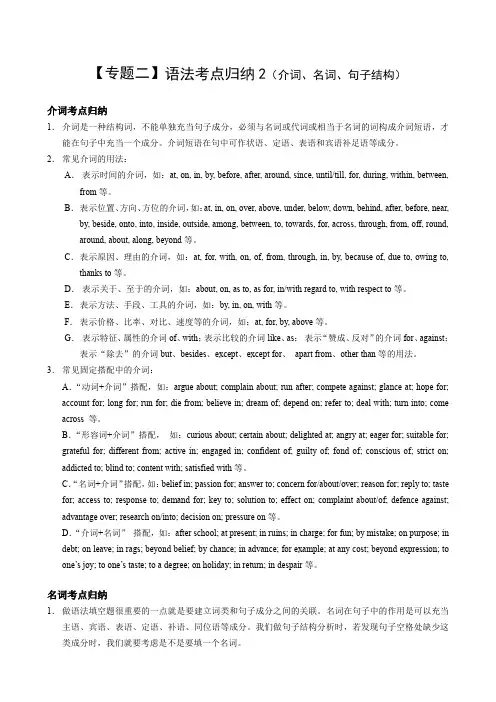
【专题二】语法考点归纳2(介词、名词、句子结构)介词考点归纳1.介词是一种结构词,不能单独充当句子成分,必须与名词或代词或相当于名词的词构成介词短语,才能在句子中充当一个成分。
介词短语在句中可作状语、定语、表语和宾语补足语等成分。
2.常见介词的用法:A.表示时间的介词,如:at, on, in, by, before, after, around, since, until/till, for, during, within, between, from等。
B.表示位置、方向、方位的介词,如:at, in, on, over, above, under, below, down, behind, after, before, near, by, beside, onto, into, inside, outside, among, between, to, towards, for, across, through, from, off, round, around, about, along, beyond等。
C.表示原因、理由的介词,如:at, for, with, on, of, from, through, in, by, because of, due to, owing to, thanks to等。
D.表示关于、至于的介词,如:about, on, as to, as for, in/with regard to, with respect to等。
E.表示方法、手段、工具的介词,如:by, in, on, with等。
F.表示价格、比率、对比、速度等的介词,如:at, for, by, above等。
G.表示特征、属性的介词of、with;表示比较的介词like、as;表示“赞成、反对”的介词for、against;表示“除去”的介词but、besides、except、except for、apart from、other than等的用法。
专题05-无提示词之填介词距离高考还有一段时间,不少有经验的老师都会提醒考生,愈是临近高考,能否咬紧牙关、学会自我调节,态度是否主动积极,安排是否科学合理,能不能保持良好的心态、以饱满的情绪迎接挑战,其效果往往大不一样。
以下是本人从事10多年教学经验总结出的以下学习资料,希望可以帮助大家提高答题的正确率,希望对你有所帮助,有志者事竟成!养成良好的答题习惯,是决定高考英语成败的决定性因素之一。
做题前,要认真阅读题目要求、题干和选项,并对答案内容作出合理预测;答题时,切忌跟着感觉走,最好按照题目序号来做,不会的或存在疑问的,要做好标记,要善于发现,找到题目的题眼所在,规范答题,书写工整;答题完毕时,要认真检查,查漏补缺,纠正错误。
总之,在最后的复习阶段,学生们不要加大练习量。
在这个时候,学生要尽快找到适合自己的答题方式,最重要的是以平常心去面对考试。
英语最后的复习要树立信心,考试的时候遇到难题要想“别人也难”,遇到容易的则要想“细心审题”。
越到最后,考生越要回归基础,单词最好再梳理一遍,这样有利于提高阅读理解的效率。
另附高考复习方法和考前30天冲刺复习方法。
[技法指导]1.(1)with 的主要含义:①(表示状态)具有②(表示伴随)随着③(表示原因)由于④(表示关系)和……在一起⑤(表示用途)用……(2)for 的主要含义:①为了②代表③因为,由于④赞成,支持⑤就……而言⑥达(表示延续的时间)(3)in 的主要含义:①在(某段时间)之后②穿着(表示状态或状况)③处于……中④(表示使用的语言等)用……⑤在……方面⑥(方向)以……方向(4)to的主要含义和用法:③(表示方向)朝……,向……②(表示程度)到……,达到……③在某些名词后常跟介词to,如:key,answer,visit, apology, solution, attitude 等。
(5)beyond的主要含义:①(表示位置)在……另一边,在……更远处②(表示程度)超出,非……所能及(6)against的主要含义:①(表示态度)反对②(表示对比)以……为背景③(表示方位)倚靠着……2.介词可位于名词之前,如at night,on Sunday等;也可位于形容词之后,如be interested in, be good at 等;还可位于不及物动词之后,如listen to, arrive at, look for 等。
2021高考英语语法填空之介词与代词一:知识储备1.填介词的情况设空后是名词、代词、动名词或what从句,且它们不在句中作主语也不作动词宾语,则该空可能填介词。
2.记牢一词多义的情况如:①against“紧靠着……;反对;反抗;和……比;以……为背景”②beyond“在……另一边;在……更远处;超出;非……所能及”③off“在……的外面;在……的沿海;偏离;从……离开”④over“在……的正上方;越过;在……期间”⑤with“和……在一起;具有;用……;凭借;关于……;随着;由于;支持”3.依据句式和搭配填介词①与动词的搭配,如:mistake...for...“把……误认为……”;devote...to...“致力于……”;look forward to...“盼望……”。
②与名词或代词的搭配,如:lack of“缺乏……”;advice on“……的建议”;approach to“……的方法”;on one's own/by oneself“靠自己”。
③与形容词的搭配,如:be afraid of“害怕”;be absent from“缺席”;be busy with“忙于”;be good at“擅长”。
1.填代词的情况当句子缺少主语和宾语时,一般要填代词;确定填代词之后,再看一下设空处所填代词是否与前文提到的人或物有指代关系。
①作主语:人称代词主语(I,we,you,he,she,they,it)。
②作宾语:人称代词宾格(me,us,you,him,her, them,it)、名词性物主代词(yours,mine,his,hers,ours,theirs,its)。
③作表语:宾格代词或名词性物主代词。
④作定语:形容词性物主代词( your,my,his,her,their,our,its)。
⑤如果宾语与主语是指同一人,用反身代词(myself,yourself,himself,herself,itself,ourselves,yourselves,themselves)。
高(Gao)考英语语法填空连词和介词,【考向聚(Ju)焦】历年高考题(Ti)中至少有一道题要考到连词或介词.介词的考查形式多样,除了单纯考查介词外,还常考查介词与(Yu)其他词的搭配.此外,在(Zai)定语从句中,也常考查“介词+关系代词”的用法.有些介词的考查频率较高,如with,beyond.连词考查较多的有:but和while,“祈使句+and/or+并列句”中的and和or;另外,for作为并列连词的用法也是一考点.对应学生用书P12用适当的连词或介词填空1.(2013•安徽,22)Before you pay a visit to a place of interest,look in your locallibrary________a book about it.解析考查介词.句意:在你去一个名胜旅行之前,在你当地的图书馆寻找一本关于它的书.本题关键在于认识到动词look与选项中的介词搭配构成固定短语的时候,其中隔有短语in your local library.答案for2.(2013•福建,29)Mrs.Smith finds it hard to clear up the mess,as her children are always________ the way whenever she tries to.解析考查介词短语.句意:史密斯太太发现想收拾一下那些乱七八糟的东西有困难,因为每当她想要做的时候她的那些孩子总是妨碍她.答案in3.(2013•湖北,30)An artist who was recently traveling on a ferry to the southern island discovered________ chance a long lost antique Greek vase.解析考查短语辨析.此处表示“偶然发现了一个遗失多年的古希腊花瓶”.答案by4.(2013•北京,26)I have an appointment ________ Dr.Smith,but I need to change it.解析考查介词.短语为have an appointment with sb,意为“与某人预约、约会”.答案with5.(2013•新课标Ⅱ,11)A serious study of physics is impossible________some knowledge of mathematics.解析考查介词.句意:如果没有一点数学知识,要认真研究物理是不可能的.答案without6.(2013•新课标Ⅰ,34)It was a real race________time to get the project done.Luckily,we made it.解析考查介词.句意:为了完成这项工程,这真是与时间的一次赛跑.答案against7.(2013•新课标Ⅰ,32)There's no way of knowing why one man makes an important discovery________another man,also intelligent,fails.解析考查并列连词.根据句意,前后两句话为两种情况的对比“一个人会做出一个重要的发现,而另一个人,也很聪明,但是失败了”.并列连词while表示对比.答案while8.(2013•重庆,23)It's not easy to change habits,________ with awareness and selfcontrol,it ispossible.解析考查并列连词.句意:改变习惯不易,但如果是有意识和有自我控制能力的话,还是有可能的.前后为转折关系,用并列连词but.答案but对(Dui)应学生用书P12介词的普通(Tong)用法【典(Dian)例1】上海)解析考查(Cha)介词的用法.among表示“三(San)者或三者以上的同类事物之间”.根据题干中“在获奖的14个人里边,中国模特占4人”可知.答案among【典例2】 He invited me to a dance after the show ________ Christmas Eve.(2009•陕西)解析考查介词的用法.atChristmas表示在圣诞期间;介词on后接具体的某一天.此处表示在圣诞节前夕,故用介词on. 答案on【典例3】 Nowadays some hospitals refer to patients ________ name,not casenumber.(2010•江西)解析句意:如今一些医院以名字来叫病人,而不是以病历号.考查固定短语.by表“方式”.答案by【典例4】 ________ the crisis of economy getting more and more serious,the government is searching for ways to improve people's life.(2013•扬州调研)解析句意:随着经济危机变得越来越严重,政府正在想方设法改善人们的生活.这里the crisis of economy getting more and moreserious是一个短语,所以应该用介词with,表示伴随;而as,when和if后面都要跟句子.答案With1.—When do we need to pay the balance?—________ September 30.解析by后接时间点,意为“不迟于”,“在……之前”.答案By2.Luckily,the bullet narrowly missed the captain ________ an inch.解析句意:子弹以一寸之差未击中上尉的头部.by可表示时间、空间、距离等数量的相差. 答案by3.A great person is always putting others' interests ________ his own.解析句意:伟人总是把他人的利益置于个人利益之上.above意为“在……上方”符合句意.答案above4.________ the production up by 60%,解析句意:由于产量增长了60%,该公司又有一个丰收年.答案With介词with的用法主要有1.表示“和……在一起”,“由……陪同”或“有……在场”The students went to the farm with their teachers.学生们与他们的老师一起去了农场.2.表示“随着……”With time passing,they have grown into big boys and big girls.随着时间的流逝,他们已经长成大小伙子和大姑娘了.3.with后面加复合宾语,说明附带情况He likes to sleep with the windows open.他喜欢开着窗户睡觉.4.表示“具有;带有;包括……在内”China is a country with a long history.中国是个历史悠久的国家.5.表示原因或理由The little girl was trembling with fear.这个小女孩吓得发抖.介词短语【典例5】 When asked about their opinions about the schoolmaster,many teachers would prefer to see him step aside ________ favor of younger men.(2011•湖北,30)解析句意:在被问到他们对校长的看法时,很多老师说他们宁愿看到他让贤于更年轻的人.考查介词短语辨析.句中的step aside表示“让位,让开”,后面接介词短语in favorof表示这些老师更赞成起用更年轻的人.答案in【典例6】 More and more highrise buildings have been built in big cities ________ lack of space.(2010•福建)解析“介词+名词+介词短语”多由in和for开头,常见的有in favour of(赞成),in honourof(为了纪念,为向……表示敬意,为庆祝),for fear of(以免)等,如for lack of(由于缺乏).答案for【典例7】We give dogs time,space and love we can spare,and ________ return,dogs give us their all.(2010•江西)解析“介词+名词”构成的固定短语也是高考的常考点,因此,熟记介词短语的意义是辨析语意的关键.常见的介词短语主要由by,for,in,on等“活跃介词+名词”构成,如bychance/accident(偶然),on purpose(故意),in return(反过来).答案in5.Do you think this shirt is too tight ________ the shoulders?解析考查介词.句意:你觉得这件衬衣的肩部是不是太紧了?across表示“从一边到另一边”,符合句意.答案across6.解析考查介词的用法.句意:达成协议似乎不可能,因为大多数委员会成员反对.against“反对”,符合句意.答案against1.动词+介词account for说明agree on对……达成协议begin with以……开始碰见go into调查keep from阻止look for寻找stand for代表agree with 同意(某人意见) answer for对……负责wait for等待decide on对……作出决定head for向……前进live on靠……生活lookinto调查stick to坚持agree to同意(某种安排等) aim at针对call for要求get into进入hear from接到……的信、电话look after照顾run into碰到wait on招待2.动词+副词+介词add up to合计达……提出get on with与……相处融洽look down upon看不起look upto敬仰(某人) put up with忍受遭到反对do away with废除keep up with跟上lookforward to盼望make up for弥补stand out for坚决要求达到get down to开始认真考虑live up to不辜负(期望) look out for当心run out of用完stick out for坚持要求3.动词+名词+介词catch sight of突然看见make room for为……腾出地方take pride in以……为荣make friends with和……交朋友pay attention to注意show interest in对……感兴趣make funof取笑take care of照顾take part in参加含有介词的成语【典例8】 We hadn't planned to meet.We met ________ chance.解析by chance为固定搭配,意为“偶然”.答案by【典例9】 His efforts to raise money for his program were ________ vain because no one showed any intention to take a cent out of their pockets.解析句意:他为这个项目筹集资金的努力徒劳无功,因为没有人愿意从腰包里掏一分钱.in vain意为“徒劳”,符合句意.答案in7.He was a good student and scored ________ average in most subjects.解析句意:他是一个好学生,大多数学科的分数在平均分之上.above表示“(数目、数量、水平、年龄)超过,多于”,符合句意.答案above8.Sometimes proper answers are not far to seek ________ food safety problems.解析考查介词.句意:有时候,解决食品安全问题的答案并不太难寻求.answerto表示“(问题)的答案”,是固定搭配.本句中的food safety problems被从properanswers的后面移至现在的位置,从而加大了此题的解题难度.答案to揭密常考的介词成语(1)含有at的成语at a time一次at least至少at the same time同时at all costs不惜一切代价at most至多at times有时候at first最初at once立即atwill任意地at last最后at present目前at work起作用(2)含有by的成语by accident偶然by day/night白天/夜间by heart能背诵by turns轮流by birth出身by no means绝不by chance偶然by mistake错误地by the way顺便说一下by chance偶然by mistake错误地by the way顺便说一下(3)含有in的成语in a sense从某种意义上说in case假使in fact实际上in one's opinion在某人看来in other words换句话说in short总之in the long run从长远来看in advance事先in store必将发生in general一般说来in no time立刻in public公开地in vain徒劳in time及时in the meantime同时in danger处于危险中in turn轮流inorder井井有条in return作为回报in the end最后in all总共(4)含有on的成语on average平均on foot步行on sale在出售on the way在途中on business出差on holiday在休假on strike罢工on time准时on duty值日on behalf of代表on thecontrary相反on the spot当场on fire着火on purpose故意地on the other hand另一方面(5)含有out of的成语out of breath气喘吁吁out of date过时out of order发生故障out of patience失去耐心out of work失业out of control失去控制out of doors 在户外out of question毫无疑问out of reach拿不到out of the question不可能out of danger脱险out of fashion不合时尚out of luck倒霉out of shape变形out of touch失去联系并列连词【典例10】 Find ways to praise your children often,________ you'll find they will open their hearts to you.(2011•山东)解析句意:设法常常表扬你的孩子,这样你就会发现他们会向你敞开心扉.考查并列连词.从句意连贯判断应用and表顺承关系.答案and【典例11】 They wanted to charge $5,000 for the car,________we managed to bring the price down.解析两个分句之间是转折关系,故用并列连词but.答案but【典例12】 In some places women are expected to earn money ________ men work at home and raise their children.解析此处是对women和men的分工进行对比,故用while,而不用but.答案while【典例13】 John plays basketball well,________ his favorite is badminton.解析yet是并列连词,表示转折.答案yet【典例14】 He found it increasingly difficult to read,________ his eyesight was beginning to fail. 解析for在此引出表示原因的并列分句.答案for【典例15】 Stand over there ________ you'll be able to see the oil painting better.解析此并列句的结构为“祈使句+and+陈述句”.祈使句表示条件,and在此引出表示结果的并列分句.答案and9.Try to read stories in English and speak in English whenever you can,________ you will see more progress over time.解析这是一个“祈使句+and+陈述句”结构.后面的陈述句表达的是前面祈使句顺承的结果,所以用and.答案and10.—I wonder how much you charge for your services.—The first two are free ________ the third costs $30.解析while是并列连词,表示对比,意为“而”.答案while11.It is often said that the joy of traveling is ________ in arriving at your destination ________ in the journey itself.解析not...but...构成固定句式,意为“不……而……”,but为并列连词.答案not;but12.I thought we'd be late for the concert,________ we ended up getting there ahead of time.解析两个分句在意义上是转折关系,故用but.答案but13.You have failed two tests.You'd better start working harder,________you won't pass the course.解析考查“祈使句+and/or+陈述句”.因为祈使句与后面的陈述句所表达的内容是对立的关系,故用or(否则).答案or14.Help others whenever you can________you will make the world a nicer place to live in.解析此并列句的结构为“祈使句+and+陈述句”.and意为“那么”,引出表示结果的并列分句. 答案and做并列连词的when和while(1)when还可用作并列连词,其意思为“这时,那时”,相当于and at this/thattime.常用于下列句式:①sb was doing sth when...②sb was about to do/going to do/on the point of doing sth when...③sb had just done sth when...如:We were having a meeting when someone broke in.我们正在开会,这时突然有人闯了进来.We were about to set off when it suddenly began to rain.我们正打算动身,这时突然下起了雨.(2)while作为并列连词,意为“而,却”,表示对比.如:He likes pop music,while I am fond of folk music.他喜欢流行音乐,而我喜欢民间音乐.对应学生用书P15用适当的介词或连词填空1.Some people do as they please regardless ________ what the result will be.解析结合上下文的意思可知应选regardless of(不管……).答案of2.She is ________ a growing number of Chinese people who are finding it increasingly difficult to find the time to read each day.解析among表示是三者以上的人或物当中的一员,相当于one of.答案among3.解析except that后接从句.答案except that4.Guangdong lies ________ the south of China and Fujian is ________ the east of Guangdong.Hainan is ________ the coast of the mainland.解析表示位置关系的几个介词中,in指位于某个范围之内,on指与……接壤,to指位于某个范围之外,off指在离……有一定距离的海上.答案in;on;off5.,but I will drop in on my friend in Guangzhou first.In other words,I will go to Shenzhen________ way of Guangzhou.解析by way of意为“经由,取道”.第二句意思:我将取道广州去深圳.答案by6.In Hangzhou,Mr.Black was so struck ________ the beauty of nature that he stayed ________ another night.解析介词by后接动作的发出者.stay for another night意为“再住一晚”.答案by;for7.Wuhan and Chongqing are among the most important cities in China ________ terms of their size and population.解析in termsof意为“就……而言”.句意:就规模和人口数而言,武汉和重庆在中国都算举足轻重的城市. 答案in8.His best-known painting that is ________ all praise will be on show in the National Gallery early next month.解析be beyond all praise意为“倍受赞誉”.答案beyond9.—What do you want to do ________ those old boxes?—To put things in when I move to the new flat.解析to put things in表明those old boxes是被用作工具,故选介词with.答案with10.The number of the employees has grown from 1,000 to 1,200.This means it has risen________ 20 percent.解析by后接增长或减少的幅度;to后接增长或减少后达到的具体数量.答案by11.Knowledge is the food of thought ________,as long as it is put in our brain,we will grow wiser.解析and连接两个并列分句,表示联合关系.答案and12.There is still much to discuss;________,we shall return to this topic at the next meeting. 解析根据句意,此处应填表示“因此”、“所以”之意的词,故选therefore.答案therefore13.It's really very dangerous.One more step,________ the baby will fall into the well.解析此句的句型结构为:祈使句+and+陈述句.并列连词and在此意为“那么”.One more step=Take one more step.答案and14.Information technology is taught in most schools,________ we have entered the information era.解析for可用作表因果关系的并列连词,连接两个分句时,后一分句对前一分句进行解释. 答案for15.I've taught him,several times,________ he still doesn't know how to do it correctly.解析虽然我教了他几次,但是他仍然不知道怎么正确地做.答案but提示课后完成《专题提升训练四》。
介词的用法归纳详细介词是英语语法中重要的一部分,它用来表示名词与名词、代词、动名词、动词或形容词之间的关系。
介词通常用于句子中作为连接词,帮助表达句子的意义和语法关系。
介词在语言学中的作用非常重要,因此了解介词的用法对于学习和掌握英语语法至关重要。
在本文中,将对介词的基本概念、分类和用法作详细的归纳,以帮助读者更好地理解和运用介词。
### 1. 介词的基本概念介词是一类用来修饰名词、代词或者动词,表示它们之间的位置、方向、时间、原因、关系等的词,是连接名词、代词或者动词与其他成分的词。
介词的出现可以构成介词短语,使得句子更加丰富和生动。
### 2. 介词的分类**2.1 按照用途分类**- **时间介词**:表示时间的介词,如in, on, at等。
- **例子**:in the morning, on Monday, at 10 o'clock- **地点介词**:表示地点的介词,如in, on, at, under, above, below等。
- **例子**:in the room, on the table, at the park, under the tree- **方向介词**:表示方向的介词,如to, from, into等。
- **例子**:go to school, come from China, into the room- **原因介词**:表示原因的介词,如because of, due to等。
- **例子**:because of the rain, due to the accident- **方式介词**:表示方式的介词,如in, by, with等。
- **例子**:in a hurry, by bus, with a smile**2.2 按照构词方式分类**- **单字介词**:由一个词组成的介词,如in, on, at等。
- **复合介词**:由两个词或两个词组合成的介词,如according to, because of等。
第5讲介词和介词短语介词是一种虚词,不能独立在句中作成分,必须与名词、代词、或动词-ing形式构成介词短语在句中作定语、表语、状语和补语等成分。
英语中,有些常用介词的有很多种用法,这些用法大都是因习惯而形成的;还有一些介词可以和名词构成固定短语。
因此,考生在平时的复习中要多加注意。
核心考点01 考查时间介词英语中,表示时间的介词很多,有的表示在片刻的时间(at);有的表示在一段时间内(in,for);有的表示特定的日子、具体日期、具体某一天的上午、下午或晚上(on);有的表示从某个时间开始(since, from);有的表示直到某个时间为止(until, till)。
这些表示时间的介词是语法填空和短文改错考查的重点。
作答时需要注意:如果表示时间的名词前是空格,而该名词或代词在句中不作主语、表语、或动词的宾语,就很可能是填介词。
典例分析Steve Jobs, the founder of the Apple Company, passed away after years of battle against pancreatic cancer ________ Oct. 6th, 2011,【解析】句意:史蒂夫·乔布斯,苹果公司的创始人,在和胰腺癌抗争了多年后与2011年10月6日去世。
【答案】on状元提醒3. in, afterin表示“在(一段时间)之后”,常用在将来时中,表示“在……之内”可以用在过去时中;after表示在一段时间之后,常用在过去时中,表示在某个具体的时间点后,可用在将来时中。
4. by, beforeby表示“不迟于某时”,包括某时在内。
by后接过去的时间,句子要用过去完成时;before后接时间点,表示“在……之前”,不包括该时间在内。
核心考点02考查方位介词英语中表示方位的介词也很多,比如:in表示“在……范围内”,on指“与……毗邻”,to指“在某环境范围之外”,off表示“离……一些距离”或“离……不远的海上”。
1 一、about 1. 在…四周;环绕: I found an English garden all about me. 在我四周环绕着一个英式花园。
2. 在…附近;靠近: explored the rivers and streams about the estate. 探究地产周围的河流和小溪 3. 关于…;关系到;相关: a book about snakes; objectivity—a part of what biography is about.
一本关于蛇的书;客观--是传记所力求
的一部分 4. 行动中,进程中;在…行动或进程中: While you're about it, please clean your 2
room. 趁你正在清理,请打扫一下你的房间。 5. 身上,性格中;在…身上或性格中: Keep your wits about you. 你要长点心眼。 6. 准备做,预备做:准备或预备做某事: The chorus is about to sing. 合唱团就要开始唱了。 二、after 1. 在之后:在地方或顺序之后: Z comes after Y. Z在Y之后。 2. 探求,追求: seek after fame; 追逐名誉; go after 3
big money. 追求钱财 3. 有关,关于: asked after you. 询问关于你的情况 4. 在…以后:时间上在…之后;比…晚一点: come after dinner. 晚饭之后来 5. 随后因为,随后不管: They are still friends after all their differences. 尽管有许多相异,他们依旧是朋友。 6. 一个接一个:持续不断地紧接着: year after year. 年复一年 7. 依照,仿照:以…的风格或模仿…: satires after Horace. 模仿贺拉斯的4
讽刺作品 8. 纪念,以…命名:与…名字有相同或相近的名字;为纪念…: named after her mother. 以他母亲的名字命名 9. 与…一致:根据…的本质或愿望;与…一致: a tenor after my own heart. 深得我心的内容 10. …点以后: five minutes after three. 三点过五分 三、against 1. 逆:与某个方向或过程相反: 5
row against the current. 逆水行舟 2. 对撞:为与…达成猛烈接触: waves dashing against the shore. 拍岸的波涛 3. 倚在;紧靠着:与…接触为了休息或按压: leaned against the tree. 斜靠着树 4. 反抗;抵抗:处于敌对状况或与…相抗衡: struggle against fate. 同命运抗争 5. 与…相反;对: against my better judgment. 与我的判断相反 6
6. 对照;对比:以…的布景或背景相对比: dark colors against a fair skin. 深色衬托出白皙的肌肤 7. 预期;以备:为…作准备;期待着…: food stored against winter. 为过冬贮备的食物 8. 预防;防御:以…为防御或保护对象: protection against the cold. 预防感冒 四、at 1. 在…里,在…附近:在某一被占据地区里或附近;在某一场所里或附近: at the market; 在市场; at our 7
destination. 在我们的目的地 2. 出现在…一面:在或接近某一位置: always at my side; 总是站在我一边; at the center of the page. 在页码中央 3. 向,朝向:到或朝某一方向或位置,尤指朝一特定目的: Questions came at us from all sides. 从四面八方向我们涌来的问题。 4. 出席:在…出现;出席: at the dance. 出席舞会 5. 在…期间:在某一时间间隔或时间跨度内: at the dinner hour; 吃饭时间; at a glance. 转瞬间 8
6. 在某一状态或状况下: at peace with one's conscience. 心安理得 7. 在某一活动或某一领域内: skilled at playing chess; 精于棋艺; good at math. 擅长数学 8. 在某一点:到达或运用比率、限度、或数量;在某一点: at 30 cents a pound; 每英镑三十分; at high speed; 以高速; at 20 paces; 在二十步处; at 350°F. 在华氏三百五十度时 9. 到达,接近:到达,接近某一时刻或9
年龄,或到某一时刻或年龄为止: at three o'clock; 到三点; at 72 years of age. 到七十二岁时 10. 根据;因为: rejoice at a victory. 因胜利而欢欣鼓舞 11. 以…方式;通过: exited at the rear gate. 从后门溜走 12. 根据;遵循: at my request. 根据我的请求 13. 凭借: at the mercy of the court. 在法庭的宽容下 10
14. 正在: at work. 正在工作 五、between 1. 在…之间:在分离的位置或时间之间: between the trees; 在树木间; between 11 o'clock and 12 o'clock. 在11点到12点之间 2. 在…之间:在质量、数量或程度上居于中间的: It costs between 15 and 20 dollars. 这价值在15到20美元之间。 3. 由于共同努力的结果: 11
Between them they succeeded. 由于共同努力,他们成功了。 4. 共享:共同拥有: They had only a few dollars between them. 他们总共只有几美元。 5. 权衡:权衡,与…做比较。通常用于表示一种互相的关系: choose between riding and walking. 在搭车和走路之间选择 六、by 1. 接近;靠近: the window by the door. 靠近门的窗户 2. 借助于;通过: 12
We came by the back road. 我们从后面的小路而来。 3. 超过:超出和在前面;超出: We drove by the house. 我们驶过了这所房屋。 4. 在…期间;在…中间: sleeping by day. 在白天睡觉 5. 不迟于: by 5:30 p.m. 不迟于下午 5:30 6. 以…计的: letters by the thousands. 数以千计的信件 7. 达到…程度: 13
shorter by two inches. 短了两英寸 8. 按照,根据: played by the rules. 按规则比赛 9. 相关,就…来说: siblings by blood. 嫡系亲属 10. 以…的名义: swore by the Bible to tell the truth. 对圣经发誓说真话 11. 被:通过某种行为或动作: was killed by a bullet. 被子弹击毙 12. 一个一个地:用于表示一系列的特定个体、组或数量: One by one they left. 他们一个接一个地离去了。 14
They were persuaded little by little. 他们渐渐被说服了。 13. 乘,除:用于乘法和除法: Multiply 4 by 6 to get 24. 4乘6得24 14. 用于度量: a room 12 by 18 feet. 12英尺宽,18英尺长的房间 七、for 1. 为了:用来指一个动作或活动的目的、目标或意图: trained for the ministry; 为政府部门培训; put the house up for sale; 把房子拍卖; plans to run for senator. 计划竞选议15
员 2. 往,向:用来指目的地: headed off for town. 出发去城里 3. 对于:用来指愿望、意图或感觉的目标: had a nose for news; 消息灵通; eager for fame and fortune. 渴求名利 4. 为:用来指一个活动的接受者或受益者: prepared lunch for us. 为我们准备午餐 5. 代表: